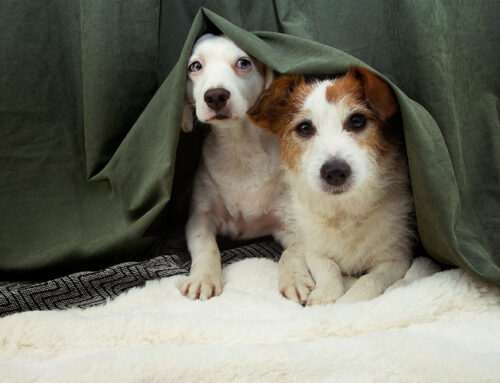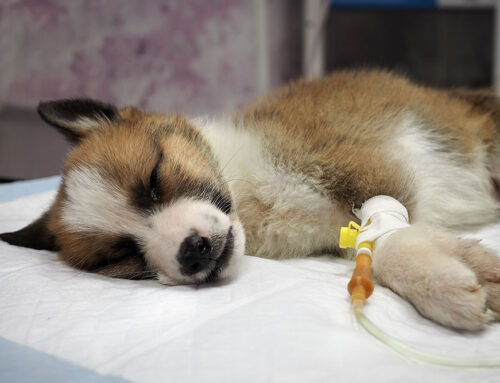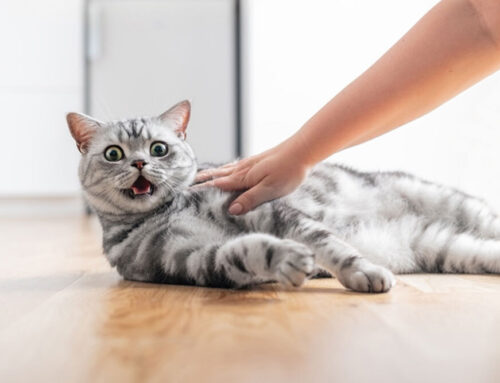No matter how well you prepare, the holidays seldom go quite as planned. Maybe the meal isn’t ready on time, your cousins fight, or your child has a meltdown. While you’re busy coming up with contingency plans for all your potential holiday problems, don’t forget about your pets. The holidays are filled with food, travel, parties, and chaos—and opportunities for pet-based trouble. Countryside Animal Hospital wants to help you prepare for and prevent an emergency, so here are seven pet disasters to avoid this season.
#1: Your pet ingests a toxin
Toxins are up there on the holiday dangers list, and can be found all around you. Here are the most common holiday toxins that can quickly harm your pet:
- Food — Chocolate, xylitol, raisins, macadamia nuts, garlic, and onions can cause signs that range from slight GI upset to seizures and death, depending on the food and amount consumed.
- Plants and flowers — Lilies are extremely toxic to cats who consume or chew them, and poinsettias, holly, and mistletoe can cause drooling and stomach upset.
- Snow globes — Snow globes may contain ethylene glycol, the same poison found in antifreeze.
Avoid food toxins by restricting pet access while you are cooking, baking, or eating, and don’t leave your pets in rooms with toxic foods if you leave. Check the ASPCA list of toxic and non-toxic plants to ensure you choose safe decorations, or use silk plants. Avoid placing snow globes near table edges or on shelves where your pets can knock them off and break them.
#2: Your pet eats fatty food and gets pancreatitis
Pancreatitis can happen spontaneously, but often occurs after pets eat a fatty meal or treat, such as fatty meat trimmings, butter, bacon fat, or cooking oil. Pancreatitis is a painful inflammation of the pancreas that causes lethargy, fever, vomiting, diarrhea, and dehydration, and your pet’s recovery will likely require hospitalization. Avoid pancreatitis by sticking to a consistent meal schedule throughout the holidays, and not allowing guests or family to give them table scraps.
#3: Your pet needs emergency surgery
Cooked bones, corn cobs, tinsel, ribbons, or string can cause intestinal obstruction, which is a life-threatening condition requiring surgery to save your pet’s life. Offer pets only safe chews made of rubber, nylon, or digestible materials, and do not give them bones, avoid tying gifts with ribbon or string, and ensure all tinsel is inaccessible to cats. Also, secure and remove trash as soon as possible.
#4: Your pet knocks over the tree
Jumping on or in the tree can easily knock the tree over, create a huge mess, and shatter breakable ornaments that could cut you or your pet. Choose non-breakable ornaments and avoid hanging them low where they could tempt your pet. Anchor the tree to a wall or the ceiling, and cover the tree water to avoid ingestion. You can also place gates or pet deterrents around the tree to keep pets a safe distance away.
#5: Your pet becomes intoxicated
Alcohol affects pets the same as humans, but their smaller bodies become intoxicated faster, and they can become poisoned with only a few licks. Never offer your pet any alcohol, and ask guests not to leave drinks unattended. Raw yeast dough can also intoxicate your pet—the dough ferments and rises in their stomach, causing alcohol poisoning, bloat, and obstruction, so never leave raw dough unattended.
#6: Your pet starts a fire
If you light candles for ambiance or as part of your holiday celebration, be mindful that pets could jump up and knock them over, burning them, or causing a house fire. Biting electrical cords can also start a fire, and dangerously shock your pet in the process. Unplug cords and blow out candles when you can’t directly supervise your pet, and when you leave the house or go to bed.
#7: Your pet has a panic attack

Most pets find changes in their routine, guests arriving, and disruptive noise extremely stressful. Keep your pet’s routine consistent, and ensure they have a safe, quiet space to relax and unwind during large gatherings or loud events like New Year’s Eve fireworks. If your pets are wary enough around strangers to present a safety issue, separate them in a crate or gate them in their quiet space. Talk to your veterinarian about medications, supplements, or other strategies that can help mitigate your pet’s anxiety.
Now that you know what could go wrong, you can take steps to ensure your pet stays safe this holiday. However, accidents happen, so call us at Countryside Veterinary Hospital right away if your pet has an emergency during our regular hours. Call your local veterinary emergency hospital for after hours emergencies, and reach out to the ASPCA Animal Poison Control Center or the Pet Poison Helpline if your pet ingests a toxin.








Leave A Comment